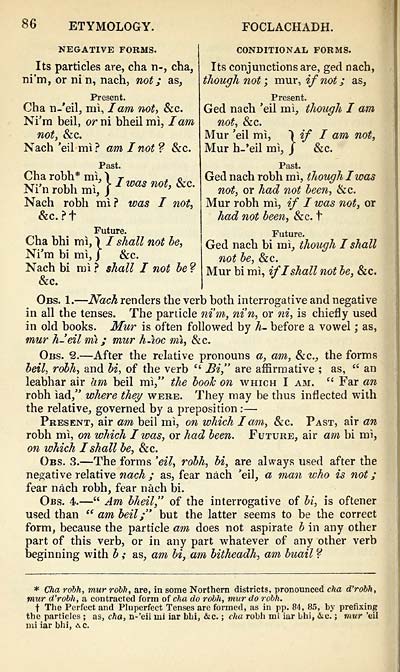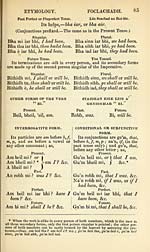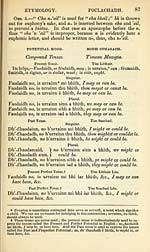Books and other items printed in Gaelic from 1841 to 1870 > Stéidhean a' Ghràmair Ghaëlig
(114) Page 86
Download files
Complete book:
Individual page:
Thumbnail gallery: Grid view | List view

86 ETYMOLOGY.
NEGATIVE FOBMS.
Its particles are, cha n-, cha,
ni'm, or ni n, nach, not ; as,
Present.
Cha n-'eil, mì, Iam not, &c.
Ni'm beil, or ni bheil mì, lam
not, &c.
Nach 'eil mì ? am I not ? &c.
Past.
Charobh*mì,ì r . .
Ni'nrobh mZ\ Iw(U ™*>* a r
Nach robh mì? was I not,
&c.?t
Future.
Cha bhi mì, 1 / shall not be,
Ni'm bi mì, J &c.
Nach bi mì ? shall I not be ?
&c.
FOCLACHADH.
CONDITIONAL FOBMS.
Its conjunctions are, ged nach,
though not ; mur, if not ; as,
Present.
Ged nach 'eil mì, though I am
not, &c.
Mur 'eil mì, \if I am not,
Mur h-'eil mì, J &c.
Past.
Ged nach robh mì, though Iwas
not, or had not been, &c.
Mur robh mì, if I was not, or
had not been, &c. t
Future.
Ged nach bi mì, though I shall
not be, &c.
Mur bi mì, iflshall not be, &c.
Obs. 1. — Nach renders the verb both interrogative and negative
in all the tenses. The particle ni'm, ni'n, or ni, is chiefly used
in old books. Mur is often followed by h- before a vowel ; as,
mur h-eil m\ ; mur h-toc mì, &c.
Obs. 2. — After the relative pronouns a, am, &c, the forms
beil, robh, and bi, of the verb " Bi," are affirmative ; as, " an
leabhar air àm beil mì," the book on which I am. " Far an
robh ìad," where they webe. They may be thus inflected with
the relative, governed by a preposition : —
Pbesent, air am beil mì, on which I am, &c. Past, air an
robh mì, on which I was, or had been. Futube, air am bi mì,
on which I shall be, &c.
Obs. 3. — The forms 'eil, robh, bi, are always used after the
neo;ative relative nach ; as, fear nàch 'eil, a man who is not ;
fear nàch robh, fear nàch bi.
Obs. 4. — " Am bheil," of the interrogative of bi, is oftener
used than " am beil ;" but the latter seems to be the correct
form, because the particle am does not aspirate b in any other
part of this verb, or in any part whatever of any other verb
beginning with b ; as, am bi, am bitheadh, am buail ¥
* Cha roih, mur rdbh, are, in some Northern districts, pronounced cha d'robh,
mur d'robh, a contracted form of cha do robh, mur do rdbh.
t The Perfect and Pluperfect Tenses are formed, as in pp. 84 , 85, by prefixing
the particles ; as, cha, n-'eil mì iar bhi, &c. ; cha robh mì iar bhi, &c. ; mur 'eil
mi iar bhi, &c.
NEGATIVE FOBMS.
Its particles are, cha n-, cha,
ni'm, or ni n, nach, not ; as,
Present.
Cha n-'eil, mì, Iam not, &c.
Ni'm beil, or ni bheil mì, lam
not, &c.
Nach 'eil mì ? am I not ? &c.
Past.
Charobh*mì,ì r . .
Ni'nrobh mZ\ Iw(U ™*>* a r
Nach robh mì? was I not,
&c.?t
Future.
Cha bhi mì, 1 / shall not be,
Ni'm bi mì, J &c.
Nach bi mì ? shall I not be ?
&c.
FOCLACHADH.
CONDITIONAL FOBMS.
Its conjunctions are, ged nach,
though not ; mur, if not ; as,
Present.
Ged nach 'eil mì, though I am
not, &c.
Mur 'eil mì, \if I am not,
Mur h-'eil mì, J &c.
Past.
Ged nach robh mì, though Iwas
not, or had not been, &c.
Mur robh mì, if I was not, or
had not been, &c. t
Future.
Ged nach bi mì, though I shall
not be, &c.
Mur bi mì, iflshall not be, &c.
Obs. 1. — Nach renders the verb both interrogative and negative
in all the tenses. The particle ni'm, ni'n, or ni, is chiefly used
in old books. Mur is often followed by h- before a vowel ; as,
mur h-eil m\ ; mur h-toc mì, &c.
Obs. 2. — After the relative pronouns a, am, &c, the forms
beil, robh, and bi, of the verb " Bi," are affirmative ; as, " an
leabhar air àm beil mì," the book on which I am. " Far an
robh ìad," where they webe. They may be thus inflected with
the relative, governed by a preposition : —
Pbesent, air am beil mì, on which I am, &c. Past, air an
robh mì, on which I was, or had been. Futube, air am bi mì,
on which I shall be, &c.
Obs. 3. — The forms 'eil, robh, bi, are always used after the
neo;ative relative nach ; as, fear nàch 'eil, a man who is not ;
fear nàch robh, fear nàch bi.
Obs. 4. — " Am bheil," of the interrogative of bi, is oftener
used than " am beil ;" but the latter seems to be the correct
form, because the particle am does not aspirate b in any other
part of this verb, or in any part whatever of any other verb
beginning with b ; as, am bi, am bitheadh, am buail ¥
* Cha roih, mur rdbh, are, in some Northern districts, pronounced cha d'robh,
mur d'robh, a contracted form of cha do robh, mur do rdbh.
t The Perfect and Pluperfect Tenses are formed, as in pp. 84 , 85, by prefixing
the particles ; as, cha, n-'eil mì iar bhi, &c. ; cha robh mì iar bhi, &c. ; mur 'eil
mi iar bhi, &c.
Set display mode to:
![]() Universal Viewer |
Universal Viewer | ![]() Mirador |
Large image | Transcription
Mirador |
Large image | Transcription
Images and transcriptions on this page, including medium image downloads, may be used under the Creative Commons Attribution 4.0 International Licence unless otherwise stated. ![]()
| Rare items in Gaelic > Books and other items printed in Gaelic from 1841 to 1870 > Stéidhean a' Ghràmair Ghaëlig > (114) Page 86 |
|---|
| Permanent URL | https://digital.nls.uk/101712967 |
|---|
| Description | Out-of-copyright books printed in Gaelic between 1631 and 1900. Also some pamphlets and chapbooks. Includes poetry and songs, religious books such as catechisms and hymns, and different editions of the Bible and the Psalms. Also includes the second book ever published in Gaelic in 1631. |
|---|

